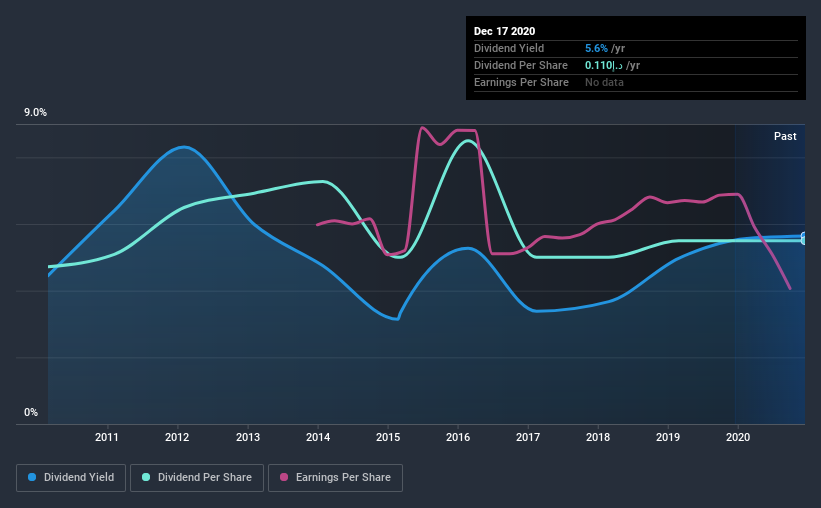- United Arab Emirates
- /
- Banks
- /
- ADX:NBQ
Is National Bank of Umm Al-Qaiwain (PSC) (ADX:NBQ) A Good Dividend Stock?

Today we'll take a closer look at National Bank of Umm Al-Qaiwain (PSC) (ADX:NBQ) from a dividend investor's perspective. Owning a strong business and reinvesting the dividends is widely seen as an attractive way of growing your wealth. Yet sometimes, investors buy a stock for its dividend and lose money because the share price falls by more than they earned in dividend payments.
A high yield and a long history of paying dividends is an appealing combination for National Bank of Umm Al-Qaiwain (PSC). It would not be a surprise to discover that many investors buy it for the dividends. When buying stocks for their dividends, you should always run through the checks below, to see if the dividend looks sustainable.
Explore this interactive chart for our latest analysis on National Bank of Umm Al-Qaiwain (PSC)!

Payout ratios
Companies (usually) pay dividends out of their earnings. If a company is paying more than it earns, the dividend might have to be cut. Comparing dividend payments to a company's net profit after tax is a simple way of reality-checking whether a dividend is sustainable. National Bank of Umm Al-Qaiwain (PSC) paid out 81% of its profit as dividends, over the trailing twelve month period. It's paying out most of its earnings, which limits the amount that can be reinvested in the business. This may indicate limited need for further capital within the business, or highlight a commitment to paying a dividend.
Remember, you can always get a snapshot of National Bank of Umm Al-Qaiwain (PSC)'s latest financial position, by checking our visualisation of its financial health.
Dividend Volatility
One of the major risks of relying on dividend income, is the potential for a company to struggle financially and cut its dividend. Not only is your income cut, but the value of your investment declines as well - nasty. For the purpose of this article, we only scrutinise the last decade of National Bank of Umm Al-Qaiwain (PSC)'s dividend payments. Its dividend payments have declined on at least one occasion over the past 10 years. During the past 10-year period, the first annual payment was د.إ0.09 in 2010, compared to د.إ0.1 last year. This works out to be a compound annual growth rate (CAGR) of approximately 1.6% a year over that time. National Bank of Umm Al-Qaiwain (PSC)'s dividend payments have fluctuated, so it hasn't grown 1.6% every year, but the CAGR is a useful rule of thumb for approximating the historical growth.
Modest growth in the dividend is good to see, but we think this is offset by historical cuts to the payments. It is hard to live on a dividend income if the company's earnings are not consistent.
Dividend Growth Potential
With a relatively unstable dividend, it's even more important to evaluate if earnings per share (EPS) are growing - it's not worth taking the risk on a dividend getting cut, unless you might be rewarded with larger dividends in future. Over the past five years, it looks as though National Bank of Umm Al-Qaiwain (PSC)'s EPS have declined at around 13% a year. A sharp decline in earnings per share is not great from from a dividend perspective, as even conservative payout ratios can come under pressure if earnings fall far enough.
Conclusion
When we look at a dividend stock, we need to form a judgement on whether the dividend will grow, if the company is able to maintain it in a wide range of economic circumstances, and if the dividend payout is sustainable. First, we think National Bank of Umm Al-Qaiwain (PSC) has an acceptable payout ratio. Earnings per share have been falling, and the company has cut its dividend at least once in the past. From a dividend perspective, this is a cause for concern. To conclude, we've spotted a couple of potential concerns with National Bank of Umm Al-Qaiwain (PSC) that may make it less than ideal candidate for dividend investors.
It's important to note that companies having a consistent dividend policy will generate greater investor confidence than those having an erratic one. However, there are other things to consider for investors when analysing stock performance. Just as an example, we've come accross 2 warning signs for National Bank of Umm Al-Qaiwain (PSC) you should be aware of, and 1 of them makes us a bit uncomfortable.
Looking for more high-yielding dividend ideas? Try our curated list of dividend stocks with a yield above 3%.
When trading National Bank of Umm Al-Qaiwain (PSC) or any other investment, use the platform considered by many to be the Professional's Gateway to the Worlds Market, Interactive Brokers. You get the lowest-cost* trading on stocks, options, futures, forex, bonds and funds worldwide from a single integrated account. Promoted
Valuation is complex, but we're here to simplify it.
Discover if National Bank of Umm Al-Qaiwain (PSC) might be undervalued or overvalued with our detailed analysis, featuring fair value estimates, potential risks, dividends, insider trades, and its financial condition.
Access Free AnalysisThis article by Simply Wall St is general in nature. It does not constitute a recommendation to buy or sell any stock, and does not take account of your objectives, or your financial situation. We aim to bring you long-term focused analysis driven by fundamental data. Note that our analysis may not factor in the latest price-sensitive company announcements or qualitative material. Simply Wall St has no position in any stocks mentioned.
*Interactive Brokers Rated Lowest Cost Broker by StockBrokers.com Annual Online Review 2020
Have feedback on this article? Concerned about the content? Get in touch with us directly. Alternatively, email editorial-team@simplywallst.com.
About ADX:NBQ
National Bank of Umm Al-Qaiwain (PSC)
Engages in the provision of retail and corporate banking services in the United Arab Emirates.
Adequate balance sheet average dividend payer.
Market Insights
Community Narratives



